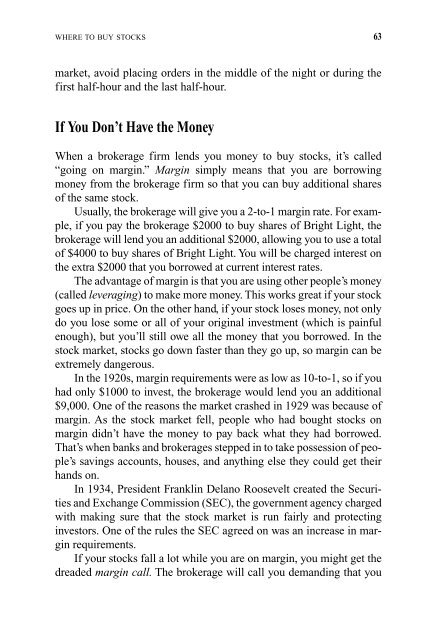Understanding Stocks
Understanding Stocks
Understanding Stocks
Create successful ePaper yourself
Turn your PDF publications into a flip-book with our unique Google optimized e-Paper software.
WHERE TO BUY STOCKS 63<br />
market, avoid placing orders in the middle of the night or during the<br />
first half-hour and the last half-hour.<br />
If You Don’t Have the Money<br />
When a brokerage firm lends you money to buy stocks, it’s called<br />
“going on margin.” Margin simply means that you are borrowing<br />
money from the brokerage firm so that you can buy additional shares<br />
of the same stock.<br />
Usually, the brokerage will give you a 2-to-1 margin rate. For example,<br />
if you pay the brokerage $2000 to buy shares of Bright Light, the<br />
brokerage will lend you an additional $2000, allowing you to use a total<br />
of $4000 to buy shares of Bright Light. You will be charged interest on<br />
the extra $2000 that you borrowed at current interest rates.<br />
The advantage of margin is that you are using other people’s money<br />
(called leveraging) to make more money. This works great if your stock<br />
goes up in price. On the other hand, if your stock loses money, not only<br />
do you lose some or all of your original investment (which is painful<br />
enough), but you’ll still owe all the money that you borrowed. In the<br />
stock market, stocks go down faster than they go up, so margin can be<br />
extremely dangerous.<br />
In the 1920s, margin requirements were as low as 10-to-1, so if you<br />
had only $1000 to invest, the brokerage would lend you an additional<br />
$9,000. One of the reasons the market crashed in 1929 was because of<br />
margin. As the stock market fell, people who had bought stocks on<br />
margin didn’t have the money to pay back what they had borrowed.<br />
That’s when banks and brokerages stepped in to take possession of people’s<br />
savings accounts, houses, and anything else they could get their<br />
hands on.<br />
In 1934, President Franklin Delano Roosevelt created the Securities<br />
and Exchange Commission (SEC), the government agency charged<br />
with making sure that the stock market is run fairly and protecting<br />
investors. One of the rules the SEC agreed on was an increase in margin<br />
requirements.<br />
If your stocks fall a lot while you are on margin, you might get the<br />
dreaded margin call. The brokerage will call you demanding that you

















